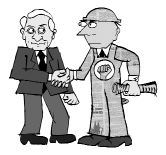The WTO anniversary fiasco was bad enough, but a peculiar incident just before Thanksgiving gave us yet another glimpse into the incompetent world of Paul Schell.
On November 20, Mayor Schell issued a memo to city employees instructing them not to grant one-on-one interviews to The Seattle Times or Seattle Post-Intelligencer representatives until the strike is settled.
The scabs howled. Schell was blasted on November 22 by an unsigned Times editorial and again on November 26 in a column by Times editorial page editor and longtime Schell nuzzle butt Mindy Cameron—and then again November 28 in a P-I editorial.
The scabs were obviously self-serving, but they were right. Public officials should be available to any media, no matter how big, small, or offensive. The city simply can’t pick and choose who to make public information available to.
At a November 22 press conference, Schell, while insisting that “I’ve never crossed a picket line in my life,” hemmed and hawed and tried to explain that the memo, which unambiguously specifies “the following media relations policies,” instead laid out his personal choice on how to handle the strike. He claimed he was only providing an optional “guideline” for how other city employees might respond. (As though a “guideline” from your boss sounds optional.)
Schell didn’t provide the obvious reply of union solidarity: “Of course I’m not going to help them do their jobs. They’re scabs.” Why didn’t Schell use the obvious retort? Well, for one thing, he was probably on shaky legal ground. For another, TV cameras were rolling and such an exchange is surefire evening news fodder. Schell apparently wasn’t that committed. Another Schell memo later that day reinstated employees’ freedom to talk with whomever they pleased.
Ron Sims, who has a brain, merely announced that he, personally, would not grant interviews to strike-breakers. Schell clearly tried to take his further, legally dubious step in part to help his uphill reelection chances. But was it also payback?
At the same press conference, called as part of his unconstitutional campaign to vilify and marginalize citizens who wanted to celebrate 1999’s WTO protests, Schell confirmed that he had multiple “conversations” with the King County Labor Council prior to labor’s decision not to hold a WTO anniversary march downtown. Schell refused to say whether he had asked the Labor Council not to march; the Labor Council, for its part, says the march didn’t happen because of logistical problems and the need to support the newspaper strike.
The Labor Council’s cancellation of an event marking what labor has claimed as a historic victory was cited by the mayor as proof that anniversary celebrants didn’t have anyone in the community on their side.
The mayor, of course, was full of shit. Thousands of people came downtown and had a rush-hour party—but only after several hours of wondering whether they would be hammered by the city for having the temerity to celebrate a triumph of democracy.
No exit
I guess I’m supposed to be thankful that Schell didn’t order a bloodbath. I am. But Schell and the SPD did get their licks in: Early on, they slandered demonstrators, scared people away from the celebrations, and tried to suppress a Dec. 2 WTO forum at Seattle Central Community College; later, at night, the pepper spray and handcuffs were pulled out on protesters who were trying to disperse—with all exits blocked by cops.
Those demonstrators would have gotten bored and gone home soon enough. But, no, Schell and the SPD had to create a fresh crew of martyrs, so as to firmly establish in the public’s mind the perception that all protesters are “lawbreakers.”
Can we expect this sort of contemptible behavior from the city for all future expressions of political speech in Seattle, or was this particular speech singled out because it grates on Schell? Regardless it would have been a much better party—and safer, too—if labor had shown up to swell the ranks and provide a way to bring the festivities to a close. Labor didn’t; it threw a separate indoor party, only a couple of blocks away from the night’s arrests. (Admirably, the Labor Council’s head, Steve Williamson, along with labor organizers Robby Stern and Jonathan Rosenblum tried to intervene in the mass arrests—only to get busted for their efforts.)
So, here’s what it smells like: Labor reverses course and cancels plans for a march, thus helping Schell’s PR battle to isolate anti-WTO celebrations; Schell reciprocates by sending out a strike-supporting memo—but fails to make his end of the deal stick, owing to his regrettable lack of working familiarity with the Constitution.
The national AFL-CIO has never been happy that their Democratic Party buddies were humiliated by last year’s protests and that labor’s mild message of wanting side agreements—the same sideboards that have proven so ineffective in NAFTA—was lost in the larger message of the WTO’s dangers. Teamsters and turtles, indeed.
When the anti-globalization movement marshaled last April in Washington, DC, the AFL-CIO stayed away. Instead big labor chose a separate time, place, and issue, flooding Capitol Hill with lobbyists demanding that China not be allowed WTO admission and permanent favored trading status. Nobody noticed, and labor lost. Labor would have also lost in Seattle, a 15-second blip in the news, without the blockade that the AFL-CIO hierarchy abhorred. There’s now a remarkable opening for reform within the WTO, precisely because all of civil society seemed to pull together in Seattle.
Not this year. Instead, labor cooperated with Schell’s election-driven effort to erase history. Schell, for his part, abused the public trust yet again and then didn’t even have the courage to admit what he’d done or stick with his convictions. (He was even quoted in the scab P-I over the weekend.) All three patterns are all too familiar. Ask any protester.
At least next year Schell won’t have the Times‘ Ms. Cameron pushing his reelection. Welcome aboard, Mindy.







